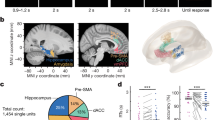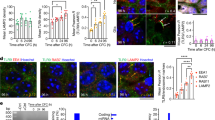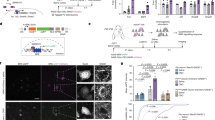Abstract
The maintenance of long-term memory in hippocampus, neocortex and amygdala requires the persistent action of the atypical protein kinase C isoform, protein kinase Mζ (PKMζ). We found that inactivating PKMζ in the amygdala impaired fear memory in rats and that the extent of the impairment was positively correlated with a decrease in postsynaptic GluR2. Blocking the GluR2-dependent removal of postsynaptic AMPA receptors abolished the behavioral impairment caused by PKMζ inhibition and the associated decrease in postsynaptic GluR2 expression, which correlated with performance. Similarly, blocking this pathway for removal of GluR2-containing receptors from postsynaptic sites in amygdala slices prevented the reversal of long-term potentiation caused by inactivating PKMζ. Similar behavioral results were obtained in the hippocampus for unreinforced recognition memory of object location. Together, these findings indicate that PKMζ maintains long-term memory by regulating the trafficking of GluR2-containing AMPA receptors, the postsynaptic expression of which directly predicts memory retention.
This is a preview of subscription content, access via your institution
Access options
Subscribe to this journal
Receive 12 print issues and online access
$209.00 per year
only $17.42 per issue
Buy this article
- Purchase on Springer Link
- Instant access to full article PDF
Prices may be subject to local taxes which are calculated during checkout




Similar content being viewed by others
References
Pastalkova, E. et al. Storage of spatial information by the maintenance mechanism of LTP. Science 313, 1141–1144 (2006).
Serrano, P. et al. PKMzeta maintains spatial, instrumental, and classically conditioned long-term memories. PLoS Biol. 6, 2698–2706 (2008).
Hardt, O., Migues, P., Hastings, M., Wong, J. & Nader, K. PKMzeta maintains one day and six-day old long-term object location, but not object identity memory in dorsal hippocampus. Hippocampus published online, doi:10.1002/hipo.20708 (5 October 2009).
Shema, R., Sacktor, T.C. & Dudai, Y. Rapid erasure of long-term memory associations in the cortex by an inhibitor of PKM zeta. Science 317, 951–953 (2007).
Yao, Y. et al. PKM zeta maintains late long-term potentiation by N-ethylmaleimide–sensitive factor/GluR2-dependent trafficking of postsynaptic AMPA receptors. J. Neurosci. 28, 7820–7827 (2008).
Nishimune, A. et al. NSF binding to GluR2 regulates synaptic transmission. Neuron 21, 87–97 (1998).
Osten, P. et al. The AMPA receptor GluR2 C terminus can mediate a reversible, ATP-dependent interaction with NSF and alpha- and beta-SNAPs. Neuron 21, 99–110 (1998).
Song, I. et al. Interaction of the N-ethylmaleimide–sensitive factor with AMPA receptors. Neuron 21, 393–400 (1998).
Brebner, K. et al. Nucleus accumbens long-term depression and the expression of behavioral sensitization. Science 310, 1340–1343 (2005).
Yu, S.Y., Wu, D.C., Liu, L., Ge, Y. & Wang, Y.T. Role of AMPA receptor trafficking in NMDA receptor–dependent synaptic plasticity in the rat lateral amygdala. J. Neurochem. 106, 889–899 (2008).
Gale, G.D. et al. Role of the basolateral amygdala in the storage of fear memories across the adult lifetime of rats. J. Neurosci. 24, 3810–3815 (2004).
Ahmadian, G. et al. Tyrosine phosphorylation of GluR2 is required for insulin-stimulated AMPA receptor endocytosis and LTD. EMBO J. 23, 1040–1050 (2004).
Whitlock, J.R., Heynen, A.J., Shuler, M.G. & Bear, M.F. Learning induces long-term potentiation in the hippocampus. Science 313, 1093–1097 (2006).
Xu, L., Anwyl, R. & Rowan, M.J. Spatial exploration induces a persistent reversal of long-term potentiation in rat hippocampus. Nature 394, 891–894 (1998).
Ling, D.S. et al. Protein kinase Mzeta is necessary and sufficient for LTP maintenance. Nat. Neurosci. 5, 295–296 (2002).
Huang, Y.Y., Martin, K.C. & Kandel, E.R. Both protein kinase A and mitogen-activated protein kinase are required in the amygdala for the macromolecular synthesis–dependent late phase of long-term potentiation. J. Neurosci. 20, 6317–6325 (2000).
Mumby, D.G., Gaskin, S., Glenn, M.J., Schramek, T.E. & Lehmann, H. Hippocampal damage and exploratory preferences in rats: memory for objects, places and contexts. Learn. Mem. 9, 49–57 (2002).
Kim, J.J. & Fanselow, M.S. Modality-specific retrograde amnesia of fear. Science 256, 675–677 (1992).
Winocur, G. Anterograde and retrograde amnesia in rats with dorsal hippocampal or dorsomedial thalamic lesions. Behav. Brain Res. 38, 145–154 (1990).
Noel, J. et al. Surface expression of AMPA receptors in hippocampal neurons is regulated by an NSF-dependent mechanism. Neuron 23, 365–376 (1999).
Lee, S.H., Simonetta, A. & Sheng, M. Subunit rules governing the sorting of internalized AMPA receptors in hippocampal neurons. Neuron 43, 221–236 (2004).
Man, H.Y. et al. Regulation of AMPA receptor–mediated synaptic transmission by clathrin-dependent receptor internalization. Neuron 25, 649–662 (2000).
Hanley, J.G., Khatri, L., Hanson, P.I. & Ziff, E.B. NSF ATPase and alpha-/beta-SNAPs disassemble the AMPA receptor–PICK1 complex. Neuron 34, 53–67 (2002).
Hayashi, T. & Huganir, R.L. Tyrosine phosphorylation and regulation of the AMPA receptor by SRC family tyrosine kinases. J. Neurosci. 24, 6152–6160 (2004).
Rumpel, S., LeDoux, J., Zador, A. & Malinow, R. Postsynaptic receptor trafficking underlying a form of associative learning. Science 308, 83–88 (2005).
Takahashi, T., Svoboda, K. & Malinow, R. Experience strengthening transmission by driving AMPA receptors into synapses. Science 299, 1585–1588 (2003).
McCormack, S.G., Stornetta, R.L. & Zhu, J.J. Synaptic AMPA receptor exchange maintains bidirectional plasticity. Neuron 50, 75–88 (2006).
Kessels, H.W. & Malinow, R. Synaptic AMPA receptor plasticity and behavior. Neuron 61, 340–350 (2009).
Saglietti, L. et al. Extracellular interactions between GluR2 and N-cadherin in spine regulation. Neuron 54, 461–477 (2007).
Migues, P.V. et al. Phosphorylation of CaMKII at Thr253 occurs in vivo and enhances binding to isolated postsynaptic densities. J. Neurochem. 98, 289–299 (2006).
Feligioni, M., Holman, D., Haglerod, C., Davanger, S. & Henley, J.M. Ultrastructural localization and differential agonist-induced regulation of AMPA and kainate receptors present at the presynaptic active zone and postsynaptic density. J. Neurochem. 99, 549–560 (2006).
Acknowledgements
This work was supported by the Canadian Institutes of Health Research and the Natural Sciences and Engineering Research Council of Canada (K.N. and Y.T.W.), the E.W.R. Steacie Foundation (K.N.) and by US National Institutes of Health grants R01 MH53576 and MH57068 (T.C.S.). O.H. was supported by the German Research Society (Deutsche Forschungsgemeinschaft).
Author information
Authors and Affiliations
Contributions
All of the authors contributed to the design of experiments, interpretation of results and editing of the manuscript. P.V.M. and O.H. conducted the behavioral studies. P.V.M. carried out the biochemical studies. D.C.W. conducted the electrophysiological studies. K.G. and O.H. performed the stereotaxic surgeries. P.V.M., O.H., T.C.S. and K.N. wrote the manuscript.
Corresponding author
Ethics declarations
Competing interests
The authors declare no competing financial interests.
Supplementary information
Supplementary Text and Figures
Supplementary Figures 1–6 (PDF 1703 kb)
Rights and permissions
About this article
Cite this article
Migues, P., Hardt, O., Wu, D. et al. PKMζ maintains memories by regulating GluR2-dependent AMPA receptor trafficking. Nat Neurosci 13, 630–634 (2010). https://doi.org/10.1038/nn.2531
Received:
Accepted:
Published:
Issue Date:
DOI: https://doi.org/10.1038/nn.2531
This article is cited by
-
Engram neurons: Encoding, consolidation, retrieval, and forgetting of memory
Molecular Psychiatry (2023)
-
Females exhibit higher GluA2 levels and outperform males in active place avoidance despite increased amyloid plaques in TgF344-Alzheimer’s rats
Scientific Reports (2022)
-
Antinociceptive effects of lead acetate in sciatic nerve chronic constriction injury model of peripheral neuropathy in male Wistar rats
Naunyn-Schmiedeberg's Archives of Pharmacology (2021)
-
Ketamine and its metabolite, (2R,6R)-HNK, restore hippocampal LTP and long-term spatial memory in the Wistar-Kyoto rat model of depression
Molecular Brain (2020)
-
GSK-3β activation is required for ZIP-induced disruption of learned fear
Scientific Reports (2020)



